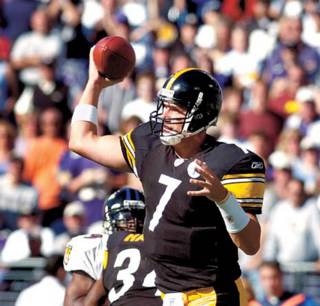
Jerry DiPaola writes in the Sunday Tribune Review that "unless Ben Roethlisberger is Dan Marino or John Elway, the Steelers have a much greater chance of failing than succeeding this season."
DiPaola looked at 12 QBs who started at least six games their rookie season and 10 of them played on teams that won no more than six games.
I think DiPaola is onto something, but I don't think he asks the right question (or at least, he's not specific enough with the question he poses). No one disputes that rookie QBs routinely struggle as they learn a new offense, game-plan against more complex defenses and adjust to the overall speed of the NFL. But in addition to starting a rookie QB, how a team performed in the preceding seasons also has an impact on the current seasons wins and losses. He cites only Marino and Elway as posting winning records their rookie seasons but what he fails to mention is that in the previous two seasons before their arrival, the Dolphins won 72% of their games and the Broncos won 48% of their games. And while winning 48% of your games may not sound that impressive, consider it is the best winning percentage of the 12 QBs examined other than Marino.
So the real question is how well do rookie QBs perform given how well the team performed in the two previous seasons. I took a look at the 12 QBs DiPaola mentioned in his column, but I also looked at how these teams performed in the two years prior to the QB's arrival. What's interesting is that five of the 12 QBs actually improved (albeit slightly) on their teams' winning percentage from the two previous seasons while seven of the QBs actually posted worse records than the previous two seasons.
Of course it's important to keep in mind why a team starts a rookie QB (rebuilding, injuries, contract disputes), and why a team might be destined to lose this season even when they were successful in previous seasons (free agency, poor draft, rebuilding). Either way, here's an extension of the table DiPaola cites in his column:
qb team rook
yrgms rook
wpctyrbef
wpct2yrsbef
wpctLeftwich JAX 2003 13 0.313 0.375 0.375 Harrington DET 2002 12 0.188 0.125 0.563 Weinke CAR 2001 15 0.063 0.438 0.500 McNabb PHI 1999 6 0.313 0.188 0.375 Manning IND 1998 16 0.188 0.188 0.563 Batch DET 1998 12 0.313 0.563 0.313 Bledsoe NE 1993 12 0.313 0.125 0.375 Mirer SEA 1993 16 0.375 0.125 0.438 Aikman DAL 1989 11 0.063 0.188 0.467 Elway DEN 1983 10 0.563 0.222 0.625 Marino MIA 1983 9 0.750 0.778 0.688 Simms NYG 1979 11 0.375 0.375 0.313
(note: rook yr = rookie year, rook wpct =To take it a step further, the correlation between how many games a rookie QB wins and how many games a team won in the previous season is 0.48. And the correlation between how many games a rookie QB wins and how many games the team won in the two previous seasons is 0.60. In English this means that the more a team wins in previous seasons, the more they're expected to win this season. And while this isn't earth-shattering news, it does explain why Marino and Elway had more success than say Bledsoe and Aikman as rookies.
rookie win percentage, yrbef wpct = win percentage the year before, 2yrsbef wpct = win percentage two years before)
So the good news is that a rookie QBs success is in part reliant on how a well (or poorly) a team performed in the two previous seasons. The bad news is that the Steelers were 6-10 last season. But there's more good news; the Steelers were 10-5-1 in 2002, which means that their two-year winning percentage prior to Roethlisberger's arrival was 52%. This is better than what the Broncos did prior to Elway's arrival and only second to the Dolphins before Marino took over.
So despite DiPaola's concerns, things are actually better than they would be if the Steelers had posted a worse record in the last two seasons. Nonetheless, what fans are most interested in are winning seasons that lead to playoff appearances. That said, I ran a simple regression to estimate how many games a rookie QB can be expected to win based on how the team did in the two previous seasons.
Over the last two years, the Steelers have won 52% of thier games and based on the 12 QBs mentioned above, the Steelers are expected to win 43% of their games this season. Of course, this is an estimate (and a very loose estimate because we're only talking about 12 other rookie QBs, and because there are virtually a million other variables that contribute to wins and losses). But again, things may not be as dire as DiPaola describes, especially when you take a closer look at the numbers. And while beating the Dolphins isn't like beating the Patriots -- or even the Pitt Panthers for that matter, it's certainly a good start for Ben Roethlisberger.


|